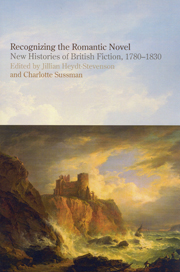Book contents
- Frontmatter
- Contents
- Acknowledgements
- Notes on Contributors
- Preface
- 1 ‘Launched Upon the Sea of Moral and Political Inquiry’: The Ethical Experiments of the Romantic Novel
- 2 Bad Marriages, Bad Novels: The ‘Philosophical Romance’
- 3 Enlightenment or Illumination: The Spectre of Conspiracy in Gothic Fictions of the 1790s
- 4 Burney's Conservatism: Masculine Value and ‘the Ingenuous Cecilia’
- 5 ‘All Agog to Find Her Out’: Compulsory Narration in The Wanderer
- 6 A Select Collection: Barbauld, Scott, and the Rise of the (Reprinted) Novel
- 7 Austen, Empire and Moral Virtue
- 8 Fanny Price's British Museum: Empire, Genre, and Memory in Mansfield Park
- 9 Between the Lines: Poetry, Persuasion, and the Feelings of the Past
- 10 Scholarly Revivals: Gothic Fiction, Secret History, and Hogg's Private Memoirs and Confessions of a Justified Sinner
- 11 Sympathy, Physiognomy, and Scottish Romantic Fiction
- Works Cited
- Index
4 - Burney's Conservatism: Masculine Value and ‘the Ingenuous Cecilia’
- Frontmatter
- Contents
- Acknowledgements
- Notes on Contributors
- Preface
- 1 ‘Launched Upon the Sea of Moral and Political Inquiry’: The Ethical Experiments of the Romantic Novel
- 2 Bad Marriages, Bad Novels: The ‘Philosophical Romance’
- 3 Enlightenment or Illumination: The Spectre of Conspiracy in Gothic Fictions of the 1790s
- 4 Burney's Conservatism: Masculine Value and ‘the Ingenuous Cecilia’
- 5 ‘All Agog to Find Her Out’: Compulsory Narration in The Wanderer
- 6 A Select Collection: Barbauld, Scott, and the Rise of the (Reprinted) Novel
- 7 Austen, Empire and Moral Virtue
- 8 Fanny Price's British Museum: Empire, Genre, and Memory in Mansfield Park
- 9 Between the Lines: Poetry, Persuasion, and the Feelings of the Past
- 10 Scholarly Revivals: Gothic Fiction, Secret History, and Hogg's Private Memoirs and Confessions of a Justified Sinner
- 11 Sympathy, Physiognomy, and Scottish Romantic Fiction
- Works Cited
- Index
Summary
Somebody in the horde of fops and merchants populating Frances Burney's second novel, Cecilia, or Memoirs of an Heiress (1782), names Vauxhall Gardens one of London's ‘semi-barbarous places’. This testimony neatly refutes the historian of manners Norbert Elias, who designates such sites of eighteenth-century leisure ‘pacified social spaces’. Indeed, Burney's London is not only not pacified, as Cecilia's guardian, who extorts his ward's property and then shoots himself in the head while rioting at Vauxhall, spectacularly demonstrates; Burney's London is also imbecilic. In a late draft of the novel, Burney blotted out the still-legible commentary of another one of Cecilia's onlookers, who remarks that urban ‘Conversation’ fails to elicit from adults even the ‘little skill’ required by ‘Children's Games’: ‘Thread the Needle may teach them grace, Hunt the Slipper dexterity, Move-all agility, & Blind Man's Buff penetration, while Hide & Seek calls for more address, perseverance & ingenuity than will be either displayed or required in such an assembly as this for a year & an half’. Burney's deleted censure offers this failure of even rudimentary cultivation as the source of Cecilia's preponderance of ‘characters, incapable of animating from wit or from reason […] [who,] void of all internal sources of entertainment, require the stimulation of shew, glare, noise and bustle to interest or awaken them’. Her list of games shows how readily Burney could gloss the sources of these characters' inner failings.
- Type
- Chapter
- Information
- Recognizing the Romantic NovelNew Histories of British Fiction, 1780-1830, pp. 99 - 125Publisher: Liverpool University PressPrint publication year: 2010



